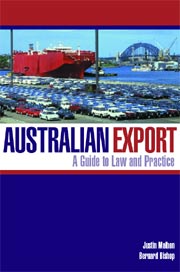Book contents
- Frontmatter
- Contents
- Figures and Tables
- Preface
- Abbreviations
- Chapter 1 An Introduction to the Export and Import of Goods and Services
- Chapter 2 Contracts for the International Sale of Goods
- Chapter 3 Incoterms
- Chapter 4 Payment
- 5 Transport of Exported Goods
- Chapter 6 Cargo Insurance
- Chapter 7 Customs
- Chapter 8 Exporting through an Overseas Representative
- Chapter 9 Exporting via Licensing and Franchising Arrangements
- Chapter 10 Exporting via an Overseas Business Presence
- Chapter 11 Dispute Settlement
- Chapter 12 Exporters and the WTO
- Index
Chapter 7 - Customs
Published online by Cambridge University Press: 05 September 2012
- Frontmatter
- Contents
- Figures and Tables
- Preface
- Abbreviations
- Chapter 1 An Introduction to the Export and Import of Goods and Services
- Chapter 2 Contracts for the International Sale of Goods
- Chapter 3 Incoterms
- Chapter 4 Payment
- 5 Transport of Exported Goods
- Chapter 6 Cargo Insurance
- Chapter 7 Customs
- Chapter 8 Exporting through an Overseas Representative
- Chapter 9 Exporting via Licensing and Franchising Arrangements
- Chapter 10 Exporting via an Overseas Business Presence
- Chapter 11 Dispute Settlement
- Chapter 12 Exporters and the WTO
- Index
Summary
One of the enduring characteristics of the nation-state is that national governments insist on the right to maintain some form of restriction over the movement of goods, people and money into and out of their territory. In this chapter we are concerned with the restrictions that are imposed on the movement of goods. Usually a customs authority or department undertakes the administration of whatever restrictions apply. In Australia, the Constitution of 1901 gave sole authority to the Commonwealth Parliament to legislate on customs matters. Since that time, there has been an Australian Customs Service to implement the laws that have been passed on the movement of goods into and out of the country. As will be seen, while the Customs Service has been the main player controlling imports and exports, it is not the only one. Being a major agricultural exporter, Australia also has several agencies dealing with the import and export of agricultural products. The most significant of these is the Australian Quarantine Inspection Service.
While national governments are the major players in determining the conditions on which goods enter and leave their territories, there has been considerable willingness on the part of nations to adopt uniform approaches to customs regulation and procedures. This willingness comes about because it is recognised that international trade is beneficial and that if there were no common approach to the adoption of laws and customs procedures the flow of trade would be significantly impeded.
Information
- Type
- Chapter
- Information
- Australian ExportA Guide to Law and Practice, pp. 154 - 183Publisher: Cambridge University PressPrint publication year: 2006
